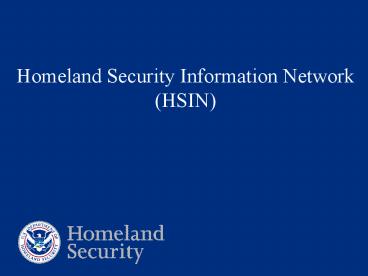Homeland Security Information Network HSIN - PowerPoint PPT Presentation
1 / 17
Title:
Homeland Security Information Network HSIN
Description:
James 'Buck' Buchanan. Deputy Director, Technology. James.Buchanan_at_dhs.gov. Steven J. Wilson. HSIN Program Manager. Steven.J.Wilson_at_dhs.gov ... – PowerPoint PPT presentation
Number of Views:268
Avg rating:3.0/5.0
Title: Homeland Security Information Network HSIN
1
Homeland Security Information Network (HSIN)
2
Contact Information
- James Buck Buchanan
- Deputy Director, Technology
- James.Buchanan_at_dhs.gov
- Steven J. Wilson
- HSIN Program Manager
- Steven.J.Wilson_at_dhs.gov
3
Road Map
- Overview
- System Capabilities
- Expansion Initiatives
4
History
- December 2002
- Grassroots pilot connecting California Terrorist
Information Center (CATIC), NYPD, and DIA. - September 2003
- Formally transferred from DIA to DHS
- February 2004
- DHS Secretary announces HSIN as the Departments
primary means for communication, collaboration,
situational awareness, and information sharing. - Directs initial deployment.
- December 2004
- Deployed to all 50 states, 53 major urban areas,
5 US territories, DC, and International.
5
HSIN Basic Structure
Federal, State, Local, and Tribal Users
State Portals
Counter-Terrorism
Law Enforcement Analysts ----------------------- L
aw Enforcement Info Sharing
Emergency Management
Critical Sectors --------------------US
P3 (formerly Private Sector)
Homeland Security Operations Center
6
Law Enforcement COI
- Only official LE personnel vetted into the
community - 28 CFR compliant
- LEO/RISSnet access
- RFI / FYI posting
- Mapping capability
- Geospatial incident reporting
- Document sharing
- Dynamic search engine
- Real time collaboration
- Current threat level
- Computer Based Training (CBT)
7
State Portal
- Developed using unique state information sharing
requirements - Louisiana Portal Provides
- Document sharing
- Mapping
- Geospatial Incident reporting
- Real time collaboration
- State Portals can be comprised of any / all of
the common services
8
GIS Mapping
- HSOC/NGA working closely to provide the domestic
situational Common Operational Picture (COP) to
all HSIN partners - Pull from compiled data repository sponsored by
DHS National Geospatial Agency - Currently have imagery for 78 cities and will
have 133 cities online by Fall 2005 - Some layers include
- Police stations
- Fire stations
- Medical centers
- Critical Infrastructure
- Operational Incidents
- Other sources available to the HSOC for
dissemination
9
Lightweight Collaboration (Jabber)
- Instant messaging
- One on one collaboration
- Chat room
- Multi-user collaboration by invitation only
- Community directory
- Look up users by agency, title etc
- User online status
- Maintains communication history
- Reference
- Accountability
10
Reach Out
- Seamlessly connected in all 50 states and 53
Major urban areas - Law Enforcement
- LE Intel/fusion centers
- Private Sectors
- EOCs
- Fire Chiefs
- Homeland Security Advisors
- Governors
- Mayors
- National Guard
11
Reach back/Reach across
- Connected to HSOC
- Alerts, analysis, reports
- 35 Agencies
- DoD,DOE,DoT,DoL
- NOAA,NGA,Cyber,IP
- FEMA,HHS,VA,SL
- ICE,CBP,FPS,CG
- CIA,NSA,DIA,IA
- FBI,DEA,ATF,USSS
- TSA,FAM,EPA,ST
- NYPD,LAPD,VaSP,MdSP,MPD,Capitol Police
12
HSIN Demonstrated Successes
- The primary communications system at National
Security Special Events and other special events
and incidents - Presidential Inauguration Election
- National Political Conventions
- 2004 Hurricane Season
- G8 International Economic Summit
- Academy Awards, TOPOFF 3
- Several DoD and Fed Law Enforcement Exercises
- Hurricanes Katrina, Rita, and Wilma
13
HSIN Practical Applications
- During Hurricane Katrina, the Louisiana State
Police reported HSIN as invaluable, the only
secure real time communications tool available
during the crisis. - LSP configured a 911 database to respond to calls
for help (over 32,000 logged) - HSIN used to track missing persons reports,
reunite families, locate missing family members,
deploy rescue/recovery operations. - South Carolina LE initially reported a Hazmat
spill resulting from a chlorine tanker car
collision that seriously affected the town
injured several 1st responders. - Orange County, CA Sheriffs Office obtained
information from the NYSP to identify a terrorist
suspect. - During 2003 Blackout, HSIN provided the only
secure real-time communications link between
several Governors offices, State and Local EOCs
and LE communities.
14
Expansion Initiative Goals
- Achieve broadest possible use of HSIN by targeted
Communities of Interest (LE, EOCs, Fire, NG,
First Responders) - Identify/address State and Local Community of
Interest requirements - Robust training to promote effective use of the
network - Improve HSIN by learning from Lessons Learned
15
DHS Future Initiatives
- Continued National Expansion with intra-State
sites regional centers with the HSOC - Secret network deployment
- HSOC Common Operational Picture (COP)
- DHS Federal LE training and connectivity
- Expansion of FEMA/Emergency Management
Connectivity
16
Questions
17
(No Transcript)































